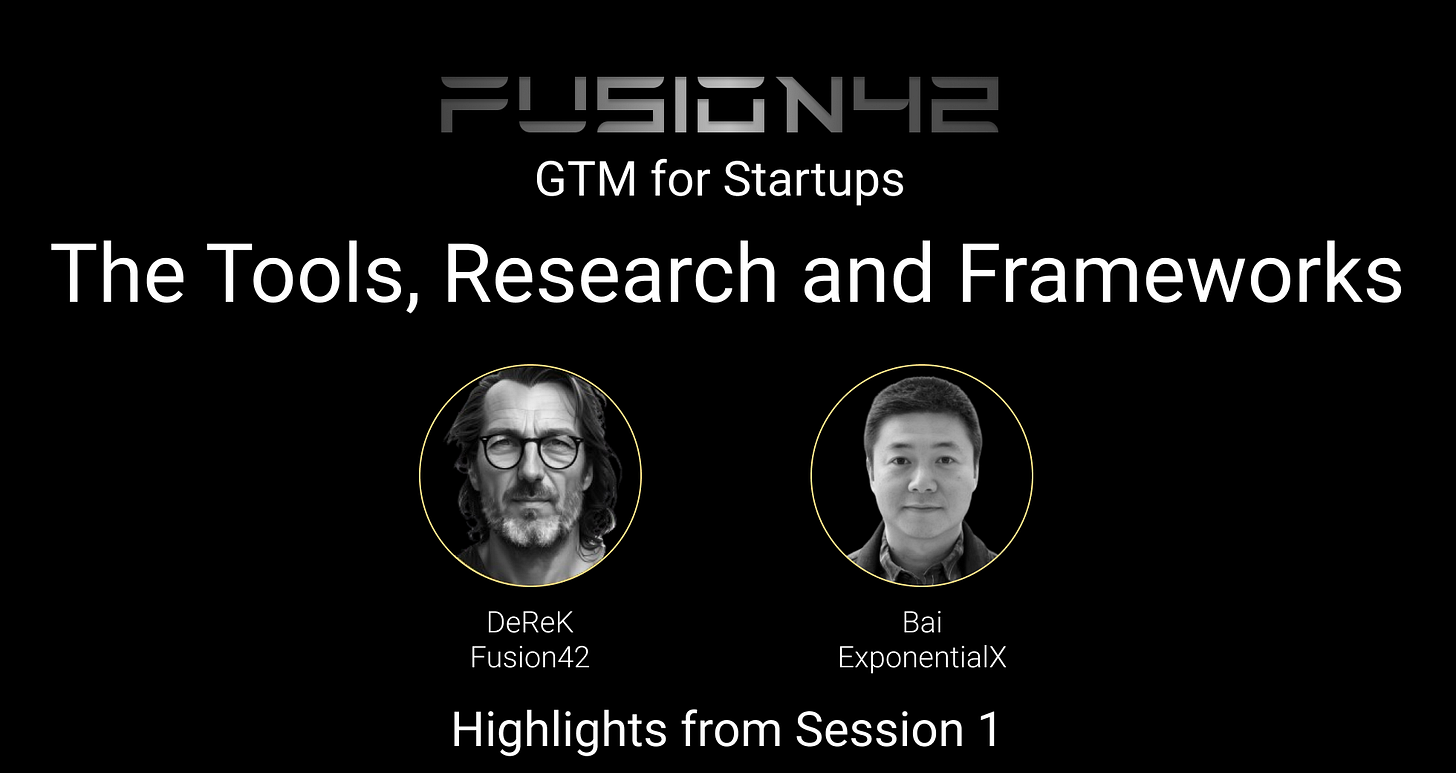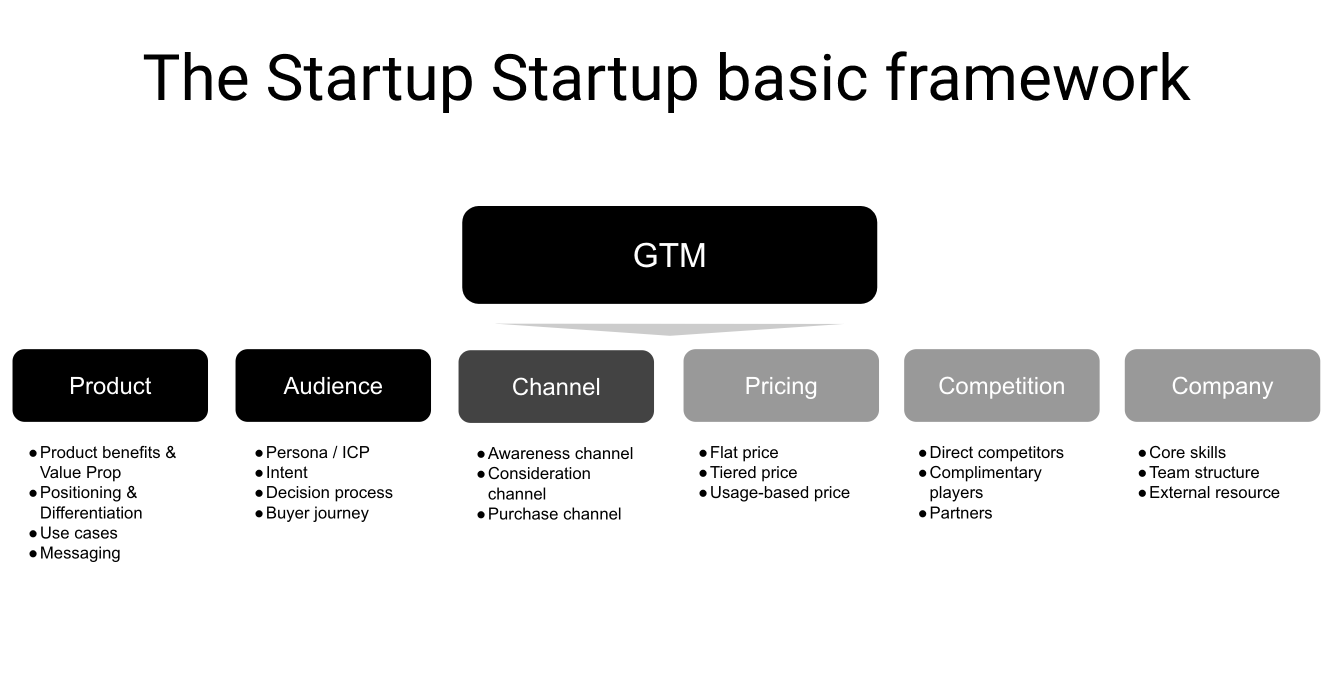July 24 2024
Here are the highlights of the Fusion 42 GTM for Startups: The Tools, Research, and Frameworks session.
Over 50 startup founders joined us to learn how to effectively navigate their go-to-market strategies.
This session provided a rich blend of theoretical frameworks, practical tools, and real-world examples to arm budding entrepreneurs with the necessary resources for successful market entry.
Topics Covered:
🌟 Introduction: Setting the stage for the GTM journey.
🛠️ Strategies and Tools for Effective GTM: Delving into essential tools like Google Analytics, Crayon, LinkedIn Navigator, and Apollo.
🌍 Practical Examples from the Field: Insights from real-world applications.
❓ Interactive Q&A Session: Engaging with the audience on specific GTM challenges.
📈 Conclusion and Look Ahead: Summarizing key takeaways and previewing future sessions.
Insights
🌟 Introduction
The session began by emphasizing the ongoing nature of Go-To-Market (GTM) strategies. GTM isn't a single event but a continuous process starting from the moment a founder decides to launch a company. The importance of differentiating between the objective and subjective aspects of GTM was stressed. Objective aspects include systems and data analysis, while subjective aspects cover branding and messaging.
🛠️ Strategies and Tools for Effective GTM
The webinar explored various tools essential for developing effective GTM strategies:
Google Analytics: Highlighted for its critical role in understanding customer behavior and optimizing marketing strategies. It provides insights into user interactions, helping startups understand and segment their approaches to target the most profitable channels.
Crayon and Kompyte: Discussed for their capabilities in providing competitive intelligence. These tools allow startups to monitor competitors’ activities, informing strategic decisions on product launches and promotional activities. Real-life examples were shared where these tools helped startups stay ahead in the market.
SurveyMonkey: Used for gathering customer feedback to refine product offerings and enhance customer satisfaction. An example was given where a startup used SurveyMonkey to gather insights that directly influenced the next product iteration.
Mention: A social listening tool that helps track brand mentions across social media. This tool allows startups to monitor customer sentiment and engage with their audience in real time.
LinkedIn Navigator and Apollo: Tools for effective B2B outreach, enabling founders to directly connect with potential clients and partners. Examples were shared of successful founder-led outreach campaigns using these tools.
"Founder-led outreach can significantly boost credibility and engagement, especially in the B2B sector."
The importance of data-driven decision-making was emphasized, showcasing how these tools aid in accurately analysing market conditions and adapting strategies based on comprehensive data.
🌍 Practical Examples from the Field
Real-world applications of these tools were highlighted through compelling case studies:
Grammarly's Evolution: This example showcased continuous product development and market adaptation. Grammarly started as a simple grammar checker for students and evolved into a sophisticated AI-driven platform serving both B2B and B2C markets. The journey highlighted the importance of adapting to market needs and expanding product offerings.
Direct Quote: Bei Zhang mentioned, "Grammarly's growth journey from a student tool to an enterprise AI writing assistant is a testament to continuous product development."HeyGen: Initially a niche product, this company rebranded and focused on specific business use cases such as educational videos and sales outreach. This targeted approach led to significant growth and a substantial increase in organic traffic. Their success was attributed to understanding market needs and effectively using tools like SEO for organic reach.
Hix.ai: Another case study discussed an AI writing software that managed to increase its daily organic traffic significantly through strategic use of SEO and targeted marketing. The company’s journey from a broad horizontal market approach to focusing on specific use cases was highlighted.
Vizard.ai: This tool automatically converts long videos into multiple short clips for social media. The company successfully identified key user personas and created tailored landing pages for different segments, resulting in higher conversion rates.
These examples illustrated how theoretical tools and frameworks could be effectively applied in practical scenarios, providing tangible benefits and driving growth.
❓ Interactive Q&A Session
The Q&A session allowed attendees to dive deeper into specific challenges they face in their GTM efforts:
Market Segmentation: Participants discussed the practical application of analytics tools for market segmentation, with examples of how to identify and target specific customer segments effectively.
Competitive Market Dynamics: Strategic responses to competitive market dynamics were explored, emphasizing the real-time application of tools like Crayon and Kompyte to stay ahead of competitors.
Founder-Led Outreach: The importance of founder-led outreach was discussed, highlighting tools like LinkedIn Navigator and Apollo for effective B2B outreach. Founders shared their experiences of directly reaching out to potential clients and the positive impact it had on their businesses.
SEO and Content Marketing: The role of SEO in driving organic traffic was underscored, with examples of startups that effectively used content marketing to gain visibility and attract users.
This segment was particularly valuable for participants, providing personalized advice and insights directly applicable to their startup challenges.
📈 Look Ahead
The session concluded with key takeaways about the importance of a data-driven approach to GTM strategies and the need for continual adaptation to market feedback and competitive pressures. Participants were encouraged to apply the tools and frameworks discussed to refine their GTM strategies continuously.
Next Session and Date
Mark your calendars for the next instalment of this insightful series, where we will delve into Defining Your Early Customer Profile (ECP) and Crafting and Strengthening Your Value Proposition.
The next session is scheduled for 21st August, and we look forward to further enriching your strategic toolkit.
Thank you for reading. If you liked it, share it with your friends, colleagues and everyone interested in the startup Investor ecosystem.
If you've got suggestions, an article, research, your tech stack, or a job listing you want featured, just let me know! I'm keen to include it in the upcoming edition.
Please let me know what you think of it, love a feedback loop 🙏🏼
🛑 Get a different job.
Share below and follow me on LinkedIn or Twitter to never miss an update.





